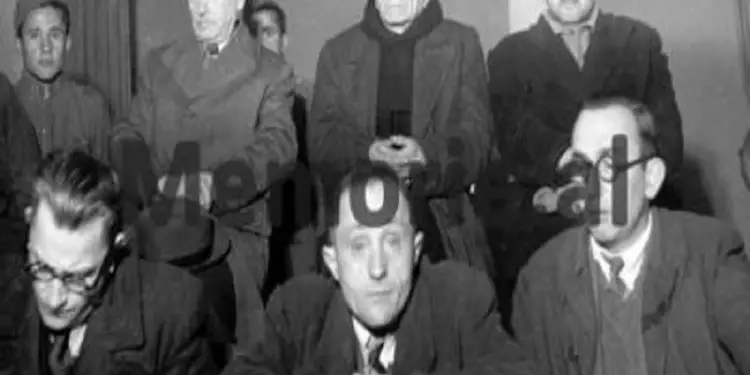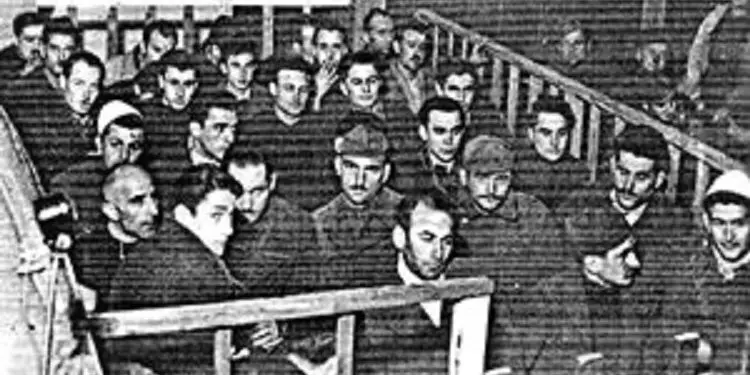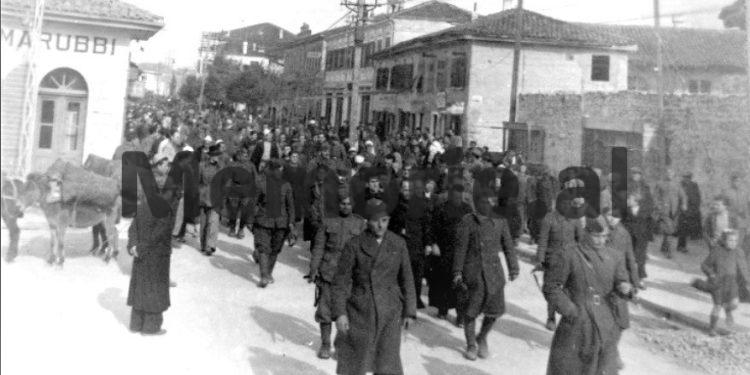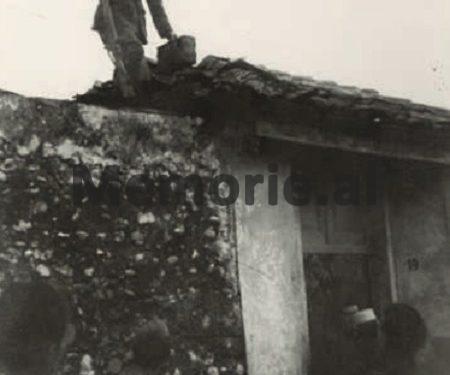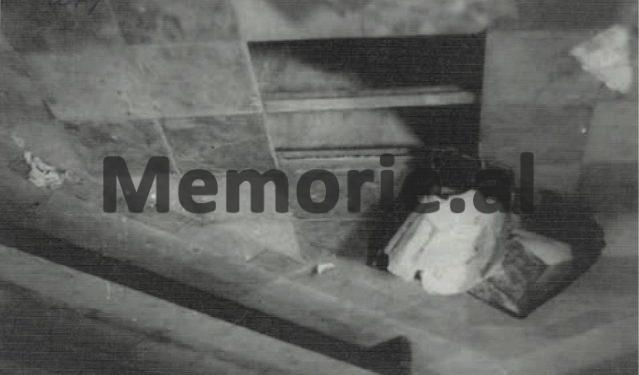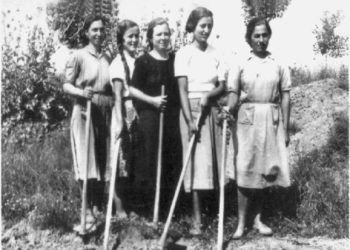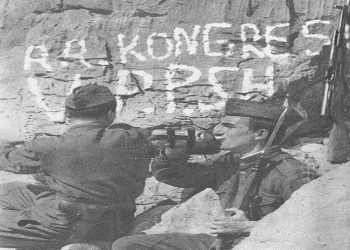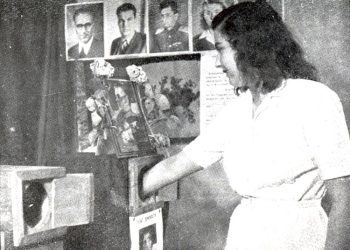From Veli Haklaj
PERSECUTION OF THE CATHOLIC CLERGY – STATE SECURITY QUESTIONS IN 1946
Memorie.al / In the history of the Albanian nation, the Catholic Church has played an important and often precious role. Unfortunately, the relationship that the communist government built in Albania, with the faith as a whole, resulted in an unprecedented wave of repression against clerics of all faiths in our country, especially against the spiritual leaders of the Catholic faithful. According to the determination made by Monsignor Rrok Mirdita: “Regardless of the gigantic strength with which the church has carried the weight of the national culture, regardless of the unbearable light it has cast on the shadows of our old and new history, regardless of the spirit of sacrifice that has accompanied her life in our country, even for these very reasons, many attacks have been launched against the Catholic Church in Albania, and one of the most terrible was the communist one, which together with the process of physical disappearance of the most vocal Catholics, staged the process of distortion of history, on the relations of the Catholic Church with Albania”.
As is known, in August 1945, the Communist Party took a number of measures to limit the activity of religion and its influence on the people. This strained relations between the government and religious institutions, especially the Catholic ones. In these conditions, with the commitment of the priests; Giovanni Fausti, Father Daniel Dajani, Father Gjon Shllaku, etc., in the Jesuit High School and in the Franciscan Seminary in Shkodër, the group “Albanian Union” and the group “Demokristian” were created respectively.
In November 1945, they were united in a single organization “Albanian Union”. As stated in its program, this organization aimed to liberate Albania from the communist dictatorship. In January 1946, the organization was discovered by the structures of the State Security. After being arrested, its members went on trial in February 1946. Eight of them were sentenced to death and executed on March 4, 1946. A few months later, the second wave of strikes against representatives of the Catholic Clergy would begin in Shkodër. One of the files that presents this tragedy, which happened in the period; September 1946-January 1948, we will publish it later in this dossier.
Through the archival documents that will be published, the reader will be introduced to the investigative-judicial process, in charge of Father Ciril Can, Father Mark Harapi, Father Frano Kirit, Father Filip Mazrekut, Father Agostin Ashiku and Dom Pjetër Gruda. In addition to getting to know the mechanism of investigation, trial and punishment of those who were considered as high-risk opponents for the communist system, the reader will also learn about many facts of interest to our history and culture, especially the relations between the Ottoman, Austrian authorities -Hungarian, of Zog’s government, of fascist, Nazi and especially communist power, with the Catholic Church, facts that are brought through the statements of the clerics condemned by the dictatorship.
We emphasize that a significant part of the facts are published for the first time. However, one must consider the fact that those who had the tragic fate of passing through the investigative sessions of the State Security had to face an unimaginable ordeal of suffering and the most inhumane tortures.
The judicial paradoxes of the arrest of Catholic clergy!
The paradox and illegality of the actions of the organs of the dictatorship in Albania, in the first years of the installation of the communist power, is also visible in the arrest orders for the defendants. The public prosecutor of the Prefecture of Shkodra, Hys Zaja, on September 21, 1946, would sign the letter of permanent ban and confinement in the prison of Shkodra, for an indefinite period, for Father Ciril Canin, who was accused of the crime of “weakening national defense”, carried out continuously, which was foreseen by article 7, paragraph II, of law no. 368, dated December 5, 1946, published in the Official Gazette no. 113, dated December 15, 1946.
So, Zaja procured, he would sign the prohibition letter on September 21, 1946, based on the charge that would be provided for in the law that would be approved 76 days later (on December 5, 1946) and that would be published in the Official Gazette after 90 days ( on December 19, 1946).
With the same charge and based on the same law, the following would be arrested: Dom Pjetër Gruda, on September 13, 1946; Father Filip Mazreku, on September 28, 1946; Father Mark Harapi, on November 5, 1946. As for Father Frano Kirin, the prosecutor Hys Zaja, would sign a temporary ban letter, on December 19, 1946. In the following, we are giving part of the minutes of the questioning of these clerics, in the offices of the State Security Section in Shkodër. We clarify that the minutes do not reflect the questions directed by the questioning officer, but only the answers of the person who was treated as a defendant.
Minutes of the questioning of Father Mark Harap
On December 12, 1946, in the office of the State Security Section, in Shkodër, first captain Nesti Kopali, in the presence of Secretary Qako Prokopi, questioned Mark Harapi, 58 years old, the son of the deceased Loro and the late Lucije, by profession sub-parish and professor of theology, in the former Jesuit Seminary, unmarried, never convicted, who stated the following:
I was arrested by the State Security bodies, as early as November 5, 1946. I believe that the Section in question arrested me on suspicion. I was and always am against atheist communism. For this reason, I spoke to the students in class, in the Seminary, as early as 1939, that God exists and that if God is denied, morality is denied and human society is stripped at the same time. Even, I said then, that a society without morals is like a house without cement. The mountaineers of the Great Highlands told me that there are atheist communists in Albania. I hate the mistake of these communists, but not the person.
The arrival of Italy found me in Shkodër. For myself, I felt bad and I did not leave the house, but the clergy in general received it well. Some have even appeared in front of the Italian troops, as a sign of respect. Of those who have gone, I remember only Father Antoni. On that day, all the churches rang their bells as a sign of celebration, by order of the elders. I.e. the parish by order of the Bishop (Thaçi), the friars by order of the Provincial (I think Padre Çiprian Nikës), and the Jesuits, by order of the Rector (Padre Chieza).
I (Father Mark Harapi) in 1941 translated from Italian, a circular from Pope Pius XI, which talks about communism, saying that it (communism) is against religion, against morality, etc. During the German occupation, I had scientific (botanical) connections with the German officer, Mangrof. We have not talked with him about political issues. The spread of the spirit of the National Liberation War during the occupation was forbidden in the Seminary. When Gjon Shllaku was told that he had tracts of the Movement, he was immediately banned. It is true that Archbishop Thaçi has kept me close to the place, but he only asked me about moral theology. For this he also marked me with an office, as Archbishop.
About Father Anton, who was in Kir of Dukagjin, I didn’t know about him at first, but later I found out about him in the schoolyard, from a child whose name I don’t remember. The child had heard it at home, while his family had heard it from a villager from Shoshi. Then I went to Father Ciprian Nika, in the Assembly of Frets, and asked him if he knew anything. He answered me that; yes. He even told me that they also brought him expenses constantly. Father Çiprani told me that; Father Mati Prenushi also knows this issue.
In the winter of last year (1945), I received a letter from Father Antoni, through the owner of the house who was holding it. In the letter he told me: “I’m sorry. Pray to God for me.” The letter had no signature. Then I answered him, writing a letter with the same name: “Don’t be upset. Please God. I forgive you”, and I didn’t mention the name. Frano Kiri, he told me in the Assembly of Gjuhadolli, that Lef Nosi was also located in the parish of Kiri. But he was bored there, and fell down. Father Franua knew, because at the time they (Lefi and Father Antoni) were in the parish, he was the parish priest himself.
I have sung the tracts of the “Albanian Union” organization, which were discovered last year, a couple of times. He gave them to me; o Brother Ljarja, o Brother Gjekaj, o Brother Gjoni, because they took them at the door. I didn’t know about Llesh Marashi’s movement, only Archbishop Thaçi told me: “Skrelis are bored; they want to do a job”. Then, in the past, I felt from the people that they had a say, that Hasan Isufi and others here should fall to [communist power].
I didn’t do any damage to the National Liberation War during the occupation, only by presenting myself as anti-religious, I hated it, i.e. in principle I was against it. That’s why I was very interested in asking, especially people who come from Tirana, whether the Movement in Tuscany was a communist movement or not. However, I did not have any concrete answer. Except someone told me this, and someone said that. Therefore, the opinion I am against the Movement has been dark, until the days when the Statute of the People’s Republic came out, which guarantees religious freedom by law.
Project – Before returning to the Statute, I have made a series of criticisms, which are also noted in the copy I found. Once I studied it at the request of the Delegate (Frano Gjin) and I came to the conclusion that the power is not in the hands of the people, as expressed by the Project – Statute, but in the hands of the Communist Party.
Creating this opinion, I have said that; article 2, of the Project – Statute, goes against the first, which says that; “all power originates from the people and belongs to the people” – while the Party is the power – and while the Party does not enjoy the support of all the people, it means that; not all the people are represented in this power.
I have also commented on article 5, where it says; “the means of production consist of the common property”. I think that in this case, it would be better if the means of production consisted of private property and the state had the right to levy a reasonable tax. Also, I have not considered the place that; the forests, pastures, lands, waters, etc., owned by the owner, should be declared the common property of the people.
In article 6, I made a remark and said that the private initiative should not be under the control of the state, but on the contrary, it should be supported by the state, etc., because from the private non-being, comes the general non-being. Regarding the agrarian reform, I did not think it was good to take the land from some and give it to others. On this occasion, I wished that the land was taken only from those who have looted it, while the others who have it by deeds should not be touched. Even taking the land for the church, we have not called it appropriate.
For the laborer, I have not desired that he should gain full freedom, only that the owner should pay him full wages. If he (the owner) does not do this, then the state must intervene. At the same time, I did not oppose that the worker could also become an owner. For the religious, it is an unjust thing, to be taken as a soldier. Even once in the time of Italy, they wanted to take the soldiers with us, but we made a case and it remained. I think that the exercise of fees should have been given a greater guarantee in the Statute. For example, where it is said; “The state is separated from the church”, it should be added; “but the state is not atheist”.
The statute says that there is freedom of the press, but today we have no press at all. So here it seems that this freedom has been violated. In article 28, of the Statute, today’s government again violates the Church, because it says: “The Church has no right to keep schools”, while the International Court of Justice of The Hague has notified the Church of this right.
I made all these criticisms to the Project – Statute, before it turned into the Statute, while back then, I didn’t say a word. In the church, I have preached several times recently, against the materialism that attacks religion, and I have always tried to prove to believers that God exists, but I do not remember ever speaking against the authorities.
About the Postriba movement, before it happened, I have no information, while later; Dom Nikoll Deda gave me some details. He came to Çelë, a week after the event, and I was the only one there. Dom Nikoll Deda told me that, from the side of Zadrima, Llesh Gjonmarkaj had come with an attack towards Tepa. However, he approached the field and left it, after his father (Gjon Marka Gjoni, who is in Italy) had informed him that; without saying a word, don’t do anything.
Dom Nikolla told me that he felt that Llesh Gjonmarkaj had a radio station that communicated with his father. Then Dom Nikola explained to me that the program was to fall to (the communist government); Jup Kazazi in Shkodër, Lleshi from Zadrima and Postriba from her side. However, the agreement was not good and did not become an organized thing.
Also in Çelë, Dom Mark Hasi told me with Dom Ernest Çoba, that Jup Kazazi killed himself out of despair that they did not raise in Shkodër. From this I understood, that it was about here as well. It is true that in a sermon on May 18, 1945, for three times in Shkodër (once in the Great Church, once in the Chapel of Çela, and once in the Seminary), I said that; “every kingdom comes and goes, but that of Christ is unchangeable”. With this I want to strengthen the belief that our religion is immortal. With Dom Mark Hasin, I discussed many times about various political events, and especially about the Peace Conference. We listened to the radio and thought that nothing was getting better.
I know that Monsignor Frano Gjini has sent a letter to the Vatican informing him that the Jacobites have acted against the government and that the Seminary is in danger. I sing the letter myself in his office. I don’t know how to send it, and I don’t even know if they answered you.
Together with Father Mati Prenushin, we were once in the Archbishopric and we talked there with Monsignor Thaçin about press issues (Catholic press), because then there was an order from the authorities that it had to be closed and we discussed how we would act, but we decided not to answer to the government at all.
We have also consulted with Father Mati Prenushin regarding the work of Father Antoni. Father Antoni told me through the master of the house that he wanted to surrender. I went and asked Father Neotea and he answered that it is soon. Even with Dom Tom Laca, we often listened to the radio and discussed political issues, but we did nothing. Memorie.al
The next issue follows




